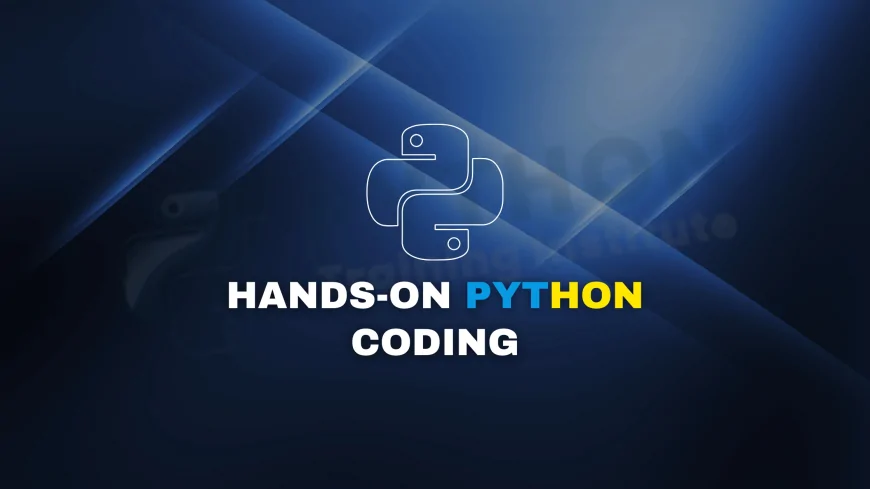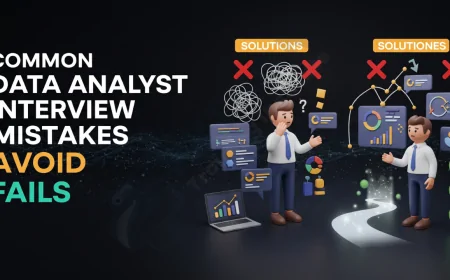Hands-On Coding with Python in Pune |Live Python Coding Sessions and Courses in Pune
Master Python through hands-on coding courses in Pune. Build real-world projects, gain job-ready skills, and get certified. Weekend & weekday batches available.

Table of Contents
- Introduction: Why Hands‑On Python in Pune?
- Benefits of Hands‑On Python Coding
- Types of Python Coding Courses in Pune
- Curriculum: What You’ll Learn
- Project‑Based Learning
- Selecting the Right Institute
- Online vs. Offline Learning
- Career Pathways after Python Coding
- Fees, Duration & Batch Options
- Testimonials & Student Success Stories
- Tools, IDEs & Environments
- Certifications & Credentials
- Interview & Career Preparation
- Emerging Python Trends
- FAQs
- Conclusion
Introduction: Why Hands‑On Python in Pune?
Pune has evolved into an epicenter of technology and innovation, with a thriving ecosystem of startups, IT consultancies, and training centers. As the demand for skilled developers grows, there's a unique opportunity for aspiring coders to gain a competitive edge through hands-on Python coding training. A practical, skills-driven approach ensures that learners don’t just memorize syntax—they build, debug, deploy, and deliver software projects that match industry standards.
This article explores why hands-on Python in Pune offers a deeply effective learning experience, how to choose the best program, and the real-world outcomes you can expect.
Benefits of Hands‑On Python Coding
- Immediate practical skill-building: Learn by doing—each module culminates in a coding task, mini-project, or real-world application.
- Confidence through success: Completing live projects (think chatbots, data dashboards, web scrapers) equips you with proof of ability.
- Industry-ready portfolio: Recruiters value demonstrable work—your capstone projects serve as live CV evidence.
- Active problem-solving experience: Hands-on sessions simulate real technical scenarios—error tracing, version control, test writing.
- Peer learning and networking: Cohorts working on projects foster collaboration and peer mentorship.
- Expert feedback: Real-time code reviews from instructors ensure you learn and apply best practices from day one.
- Flexible, modern delivery: Hybrid, online weekends, evening batches suit different learning styles and schedules.
Types of Python Coding Courses in Pune
Pune has emerged as a tech learning hub, offering various types of Python coding courses that emphasize hands-on practice. Below are the top types of training programs you can explore:
Beginner-Level Python Programming Courses
-
Ideal For: Freshers, college students, non-programmers
-
Focus Areas: Basic syntax, loops, functions, file handling, and simple coding tasks
-
Hands-On Activities: Mini-projects like a calculator, to-do list app, or file organizer
-
Institutes Offering: Seed Infotech, Techrel Institute, Ethans Tech
Full-Stack Python Developer Courses
-
Ideal For: Aspiring web developers
-
Focus Areas: Python + Django/Flask + Frontend (HTML/CSS/JS) + MySQL/PostgreSQL
-
Hands-On Activities: Building e-commerce sites, blogs, inventory apps
-
Popular Institutes: Felix ITs, CodeKul, Edureka Pune center
Data Science and Python Analytics Courses
-
Ideal For: Engineers, analysts, MBA grads, science graduates
-
Focus Areas: NumPy, Pandas, Matplotlib, Scikit-learn, data wrangling, ML models
-
Hands-On Projects: Predictive modeling, customer segmentation, data dashboards
-
Top Providers: DataMites, iNeuron (Pune), AnalytixLabs (online with Pune batches)
Python for Automation and Scripting
-
Ideal For: QA testers, sysadmins, DevOps engineers
-
Focus Areas: Automating repetitive tasks, web scraping, file automation, Selenium
-
Hands-On: Script to automate Excel reports, test cases, data scraping tools
-
Training Centers: Webasha Technologies, 3RI Technologies, Radical Technologies
AI/ML Python Courses
-
Ideal For: Those targeting advanced careers in artificial intelligence and machine learning
-
Focus Areas: Deep learning with TensorFlow, PyTorch, NLP, computer vision
-
Projects: Image classification, sentiment analysis, chatbot development
-
Best Options: Jigsaw Academy (with in-person workshops), Great Learning (Hybrid)
Corporate & Custom Python Training
-
Ideal For: Companies, startups, and teams wanting internal upskilling
-
Features: Custom curriculum, industry project integration, weekend classes
-
Hands-On Work: Case studies, Git version control, cloud deployment
-
Providers in Pune: Coding Elements Corporate, Webasha, Besant Technologies
Weekend & Fast-Track Python Bootcamps
-
Ideal For: Working professionals
-
Format: 2-week, 1-month intensive coding marathons
-
Highlights: Group projects, hackathon-based learning, live assessments
-
Noted Institutes: Iteanz, MindScripts, LearnBay Pune
Academic + Industrial Python Training (University Affiliated)
-
Ideal For: Students seeking certification + internship
-
Modules: Theory + Practical labs + Industry use-cases
-
Institutions: MIT-WPU, DY Patil Institute of Tech (with IBM/Infosys tie-ups)
Mobile & App-Based Python Coding Courses
-
Ideal For: Self-paced learners using mobile apps or tablets
-
Mode: Online with assignments and remote mentor support
-
Top Platforms: Coding Ninjas Mobile, Sololearn Pune Live Sessions, GUVI
Online Live Python Coding Courses with Pune Mentors
-
Ideal For: Remote learners who want city-local mentoring
-
Features: Zoom/Google Meet classes, live IDEs, coding challenges
-
Options: UpGrad Campus, Scaler Academy, Real-Time Experts
Each of these types offers practical, project-driven learning, which is essential for mastering real-world programming scenarios. Based on your goals—whether web development, data analytics, or automation—you can pick the most suitable course type.
Curriculum: What You’ll Learn
A typical hands-on Python curriculum includes:
- Core Python & Scripting: Variables, control flows, functions, OOP, file and exception handling.
- Web Development: Flask, Django, RESTful API design, templating (Jinja2), session/auth mechanisms, deployment (Heroku/AWS).
- Automation & Scripting: Web scraping (BeautifulSoup, Selenium), Excel/PDF automation, cron-job basics.
- Data Handling: Pandas, NumPy, Matplotlib, CSV/JSON processing, basic analytics workflows.
- Database Integration: SQLite/MySQL connections, ORM (SQLAlchemy), migrations.
- Testing & CI: Unit tests, pytest, coverage, Git workflows.
- Project Modules: Chatbots, portfolio sites, ecommerce mocks, data dashboards.
Project‑Based Learning
Most practical courses in Pune focus on at least 3–5 hands-on capstone projects, such as:
- Interactive Chatbot: Build a command-line chatbot using Python’s NLP or basic pattern matching.
- Data Visualization Dashboard: Create a Flask app that visualizes public datasets.
- Web Scraper + Automator: Automate data extraction and delivery via email export.
- Mini E‑commerce Mockup: Build product pages, search and checkout processes using Django.
These projects are chosen to replicate real-world scenarios, ensuring you develop problem-solving, deployment, and feature-extension skills.
Selecting the Right Institute
Choosing the right institute can significantly impact your coding journey and career trajectory. Pune, being an educational and IT hub, offers dozens of Python training providers—but not all are equally effective when it comes to hands-on, project-based learning. Here's how to evaluate and select the best one for your goals:
1. Check for Project-Based Learning Approach
-
Look for institutes that emphasize practical coding over just theory.
-
Ensure the curriculum includes capstone projects, mini assignments, and real-world problem solving.
-
Ask for project samples or student GitHub portfolios before enrolling.
2. Qualified and Industry-Experienced Trainers
-
Prefer trainers who have real industry experience, not just academic backgrounds.
-
Look for trainers who’ve worked in fields like data science, automation, web development, or DevOps.
3. Batch Flexibility (Weekend, Evening, Fast-Track)
-
Institutes like Webasha in Pune offer batch customization.
-
Choose one that fits your personal schedule—especially if you’re a working professional or student.
4. Curriculum Updates & Tool Integration
-
The tech stack is ever-evolving. Ensure the course includes:
-
Latest Python versions (3.10+)
-
Libraries like Pandas, NumPy, Flask, Django, TensorFlow
-
Git/GitHub, APIs, and IDEs (like VSCode or PyCharm)
-
-
Bonus if cloud platforms (AWS, Azure) or version control are part of the curriculum.
5. Live Coding & Mentorship Support
-
Best institutes provide interactive coding sessions, live debugging, and mentorship.
-
Ask: Do they offer one-on-one mentor help if you’re stuck during coding?
6. Job Placement and Internship Tie-Ups
-
Institutes like WebashaTechnologies, have placement support and internships.
-
Ask about previous placement records, tie-ups with companies, and mock interview training.
7. Student Reviews & Alumni Outcomes
-
Browse Google reviews, Justdial, or Trustpilot for honest student feedback.
-
Connect with alumni on LinkedIn to ask about course value and outcomes.
8. Certifications and Global Validity
-
Choose courses that offer recognized certifications (e.g., Microsoft, IBM, or NASSCOM-affiliated).
-
Certification helps when applying for internships or jobs, especially in MNCs.
9. Cost vs. Value Delivered
-
Don't just go for the cheapest option. Consider:
-
Faculty quality
-
Project support
-
Access to learning resources (recordings, LMS, code repositories)
-
10. Trial Classes or Demo Sessions
-
Reputed institutes offer free demo classes. Attend one before making a final decision.
-
Check for class engagement, trainer expertise, and how doubts are handled.
Suggested Institutes in Pune (Based on Above Criteria):
Webasha Technologies –
- Great for automation + scripting hands-on.
-
Excellent for live projects and job assistance.
-
Known for full-stack and Python-Django hands-on training.
-
Offers extensive capstone projects and weekend flexibility.
-
Strong in AI/ML and data-centric Python learning with projects.
Online vs. Offline Learning
| Feature | Offline | Online |
|---|---|---|
| Interaction | High (in-person support) | Moderate (chat, breakout rooms) |
| Hands-on Environment | Local lab setups | Cloud IDEs, remote desktops |
| Timing Flexibility | Fixed schedules | Weekend, evening, recorded sessions |
| Networking | Peer meetups, local alumni | Online communities, Slack/Discord |
Career Pathways after Python Coding
With hands-on Python skills you'll be ready for:
- Backend Engineer: Build REST APIs, microservices in Flask/Django.
- Automation Engineer: Create scripts to automate workflows, testing tasks.
- Data Analyst: Clean datasets, perform analysis, visualize trends.
- Full-Stack Developer: Combine Python backend with front-end frameworks (React/Angular).
- DevOps/SRE: Automate deployments, containerize apps, write CI/CD pipelines.
Fees, Duration & Batch Options
Fees: ₹20,000–₹60,000 based on depth (projects, mentorship, placement support).
Duration: 2–6 months (full-time/internship models).
Batch Times: Weekdays (morning/evening), weekends. Many institutes offer flexible EMI options.
Testimonials & Student Success Stories
“I built my first Django app in the 6th week and deployed it to Heroku by the end of week 8. That hands-on momentum boosted my confidence more than any theory class.” – Anchal P., Pune
“The capstone data-visualization project helped me land an analytics internship even before I graduated.” – Rahul V., Pune University
Tools, IDEs & Environments
- Python 3.x with venv/virtualenv
- IDEs: PyCharm, VSCode
- Unit Testing: pytest, unittest, coverage
- Databases: SQLite, MySQL
- Deployment: Git, GitHub, Heroku, AWS EC2
- Package Management: pip, requirements.txt, dotenv for config
Certifications & Credentials
Many programs issue a course completion certificate along with project badges. Optionally, some offer exam prep for global certifications like PCEP or PCEP2 for Python.
Interview & Career Preparation
Quality programs prepare you for job readiness by including:
- Resume and GitHub walkthroughs
- Coding challenge practice (LeetCode, HackerRank)
- Mock interviews—technical and HR
- Relevant portfolio showcasing capstone projects
Emerging Python Trends
- AI & ML: Integration with TensorFlow/PyTorch
- IoT: Programming for Raspberry Pi using Python
- Serverless: AWS Lambda with Python handlers
- Data Pipelines: ETL tasks using Python scripts
Frequently Asked Questions (FAQs)
1. What is hands-on Python coding?
Hands-on Python coding means learning through building real applications—writing scripts, debugging, using tools—rather than only reading theory or watching videos.
2. Do I need prior coding experience?
Not necessarily. Many beginner-friendly programs help you start from scratch, covering basics before moving to advanced topics and projects.
3. How long does a comprehensive program take?
Depending on schedule, most run 2–6 months. Bootcamps deliver quicker immersion, while certification tracks offer deeper coverage with stretch time.
4. What projects will I build?
Common projects include chatbots, web apps (Flask/Django), data dashboards, automation scripts, and terminal utilities.
5. Are these courses online or offline?
You’ll find both. Offline offers lab access and face‑to‑face interaction; online provides flexibility, recorded backups, and remote support.
6. Will I get career support?
Top programs include resume assistance, interview prep, challenge practices, and placement networks—but verify before enrolling.
7. What tools do I need?
Install Python 3.x, set up an IDE like PyCharm or VSCode, use Git/GitHub, and optionally set up a local database (SQLite/MySQL).
8. Do I need specific hardware?
No. Any laptop or desktop with at least 4 GB RAM works fine. For data-heavy tasks, 8 GB+ is ideal.
9. What is the cost?
Fees generally range from ₹20,000 to ₹60,000, depending on depth, format, mentorship, and placement assistance.
10. Do I receive a certificate?
Yes—upon completion, most institutes provide a certificate and project documentation to add to your GitHub portfolio.
11. Will this help me get a job?
Yes. A hands-on projects portfolio plus career prep support opens doors for roles in development, analytics, or automation.
12. What are the career roles I can choose?
Backend developer, automation engineer, data analyst, DevOps, or even tech-focused entrepreneurship.
13. How do I know an institute is good?
Check trainer credentials, demo session quality, student reviews, placement history, and project assessments.
14. What batch timings are available?
Morning, evening, and weekend cohorts are common. Online programs offer even greater flexibility.
15. Is Python in demand?
Yes—across fields like web dev, data, automation, AI, and more. Hands‑on Python skills are highly valued.
16. Will I work with databases?
Yes. SQL integration, ORM handling, and CRUD operations are core parts of most hands-on training.
17. Is learning Flask enough?
Flask provides modular web development; it’s enough for small and mid-size projects. Many programs also offer Django for larger systems.
18. Will I learn version control?
Yes. Git and GitHub are standard components, including branching, pull requests, and collaboration workflows.
19. What if I miss a class?
Most programs record sessions or offer catch-up support and help you stay on pace with cohorts.
20. How do I get started?
Start by exploring course outlines, attending a free demo, clarifying your goals (e.g., job, side project, data exploration), and committing to hands-on practice!
Conclusion
Hands‑On Python coding in Pune offers more than just syntax knowledge—it gives real-world experience, confidence, and a job-ready portfolio. With a vibrant tech scene, expert-led programs, and practical models, Pune is the perfect city to start or elevate your Python journey. Choose the course that aligns with your learning style and career goals, and take the next step toward developer excellence.
What's Your Reaction?
 Like
0
Like
0
 Dislike
0
Dislike
0
 Love
0
Love
0
 Funny
0
Funny
0
 Angry
0
Angry
0
 Sad
0
Sad
0
 Wow
0
Wow
0














